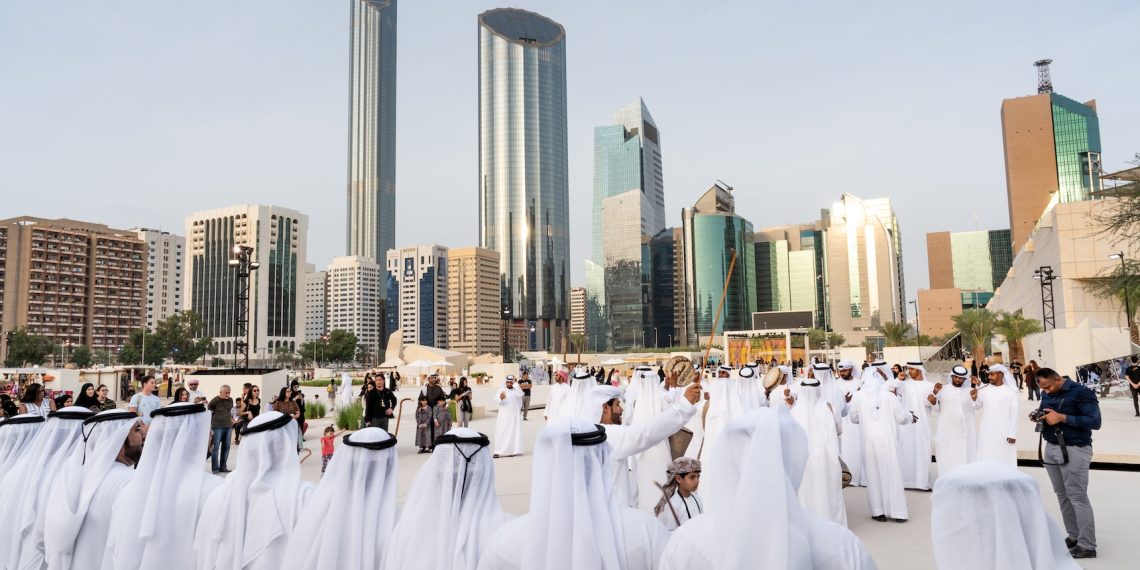Please cite as:
Shewan, Molly. (2025). “Populism and Autocracy in the Gulf Countries.” European Center for Populism Studies (ECPS).January 10, 2025. https://doi.org/10.55271/rp0094
On December 19, 2024, ECPS hosted the 18th session of the Mapping Global Populism (MGP) Panel Series, titled “Populism and Autocracy in the Gulf Countries.” This session examined a number of key contemporary dynamics at the intersection of populism and authoritarianism in the Gulf region. A distinguished panel of experts presented on a wide range of topics, including the evolution of social contracts in Gulf states; autocratization processes; the environmental dimension of authoritarian leadership; and the role of religion in shaping both domestic and international politics. The session thus offered many key critical insights into both the nebulous features of populism itself and the importance of bringing the Gulf region into scholarly conversation regarding populism’s impact across the globe.
Report by Molly Shewan
The European Center for Populism Studies (ECPS) hosted the 18th session of the Mapping Global Populism (MGP) Panel Series, “Populism and Autocracy in the Gulf Countries,” on December 19, 2024. The session explored the complex dynamics surrounding populism and authoritarianism across the Gulf region. Bringing together a distinguished panel of scholars and practitioners, the discussion focused on a number of key developments, including the environmental and religious dimensions of autocratic leadership in the Gulf States, as well as the evolution of the social contract, in order to examine the diverse causes, manifestations and impacts of populism and authoritarianism in the region.
Moderated by Dr. Courtney Freer, Assistant Professor at the Department of Middle Eastern and South Asian Studies-Emory University, the panelists included Dr. Thomas Demmelhuber, Professor of Middle East at the Friedrich Alexander University, Erlangen-Nürnberg-Germany; Dr. Gail Buttorff, Hobby School of Public Affairs-University of Huston; Dr. Tobias Zumbraegel, senior researcher and lecturer at the Department for Human Geography at Heidelberg University-Germany; Mr. Kardo Kareem Rached, University of Human Development-Iraq, and Dr. Kristin Smith Diwan, senior resident scholar at the Arab Gulf States Institute in Washington.
The panel made a multidisciplinary, wide-ranging, and insightful contribution to the scholarly exploration of populism and autocracy in the rapidly evolving social and political context of the Gulf region. Therefore, this session constitutes a significant and timely addition to the panel series overall, aiding in its goal of generating a more complete understanding of the diverse impact of populism and authoritarianism across the globe.
Panel Overview
Dr. Thomas Demmelhuber opened the panel with his presentation on “Key Drivers of Autocratization in the Gulf Region.” Dr. Demmelhuber began by arguing that Gulf regimes are often much too complex to be neatly categorized into a binary division between democracy and authoritarian governance. Rather, he regards autocratization as a fluid, multifaceted process which can occur within a variety of regime types in notably different ways. Dr. Demmelhuber argued that autocratization is primarily driven through the actions of prominent elites at the domestic, regional and international levels.
At the domestic level, populist discourses can be utilized as a means of consolidating regime power, utilizing affective appeals to the citizenry as a united collective in order to strengthen the legitimacy of the regime. At the regional level, regimes often learn from one another and adapt their political strategies to mirror their neighbors, which is linked to the emergence of authoritarian gravity centers. On the international level, norm diffusion can occur through transnational networks, promoting authoritarian practices across the globe. Dr. Demmelhuber concluded his insightful presentation by flagging the need for greater scholarly interrogation of the non-material dimension of populist appeals, as well as of the populism which emerges “from below.”
Our second speaker, Dr. Gail Buttorff, a researcher of gender and political participation in the Middle East, followed with an engaging talk titled “The Evolving Social Contract in the GCC” with a particular focus on gender as a key factor. Dr. Buttorf began by offering a succinct overview of the social contract in the GCC up to the 2000s, which was heavily reliant upon strong wealth redistribution and a generous welfare state in exchange for limited political participation by the citizenry. She then went on to note a variety of factors that have put pressure on this institutional arrangement since then: declining oil rents, lower revenue, and growing populations, which led Gulf states to embrace austerity while unemployment was rising.
In an effort to renegotiate their social contracts in this new contemporary context, Gulf regimes have deployed policies of labor renationalization, which in turn resulted in a significant increase in female employment, as well as “vision statements” which explicitly emphasize “mutuality” between state and citizen responsibility. The gendered impact of these adjustments was particularly visible during the COVID-19 outbreak, as a number of states – including the UAE and Bahrain – passed legislation which illustrated the intersection between labor nationalization and women’s participation in public life.
Overall, Dr. Buttorff effectively explored the ways in which Gulf states have attempted to retain legitimacy in uncertain economic conditions by adjusting their social contracts, with particularly significant implications for women across the region.
Dr. Tobias Zumbraegel, who has written extensively on the environmental dimension of state power in the Gulf, turned to focus on the environmental dimension in his presentation: “The New Green Autocrats: How Saudi Arabia and the UAE Redefine Environmental Leadership.” He, too, began by examining the social contract in the Gulf, emphasizing the enhanced role of provision and protection by regimes—made possible through the vast income generated by the oil and gas industries—in exchange for a lack of participation by their citizens. In the wake of growing pressures to lessen their dependence on fossil fuels, Dr. Zumbraegel argued that the emerging “Green Gulf Model” is characterized by strong, personalistic leadership, a techno-utopian vision which perhaps over-exaggerates the potential for new technologies to reverse environmental harm, strong emphasis on the continuing importance of fossil fuels; and a close alignment of environmental goals with other economic diversification projects, such as in sports and entertainment. Dr. Zumbraegel further sought to locate the role of these “green autocrats” in influencing global environmental governance, supported by a strong alliance of transnational corporations whose goals align with those of the Gulf regimes.
To conclude, Dr. Zumbraegel argued that autocratic regimes in the Gulf have embraced a top-down approach to sustainability. By gradually pivoting towards green energy yet continuing to protect their oil and gas interests, Gulf states are attempting to maintain the rentier welfare state system whilst neglecting the environmental and social justice dimensions of sustainability altogether.
Mr. Kardo Kareem Rashed, an expert on the intersection between religion and politics in the Middle East, discussed the intersection between religion and authoritarianism in his talk: “The Role of Salafism in the National and International Politics of Gulf Monarchies.” Taking a historical-analytical approach, Mr. Rashed began by tracing the roots of Salafism back to Saudi Arabia, emphasizing its complex role in shaping Saudi Arabian domestic and international politics since 9/11 due to links with Jihadism. He went on to note the relevance of the political decision-making process in Saudi Arabia, a strictly patrimonial regime, wherein power flows downwards through a hierarchical model of authority from the King to tribal sheikhs and army leaders.
As Saudi Arabia evolved into a rentier state, Mr. Rached argues, Salafism became institutionalized; post-World War II, Salafism was a powerful tool used by Saudi King Faisal to oppose and suppress Arab nationalist movements, bolstered through the establishment of new educational institutions. The Gulf War marked a key turning point, however, as the Salafist movement rejected the presence of US troops on Saudi soil. As a result, the Saudi state began to tighten control over religious institutions and strengthened alliances with other nations on the basis of shared Islamist ideology. Overall, Mr. Rached argued, in a supposedly post-Salafi era, a complex relationship remains between the Saudi state and transnational religious dynamics.
Finally, Dr. Kristin Smith Diwan, a leading scholar on the politics of Arab Gulf States, presented on the topic “Populism in Gulf Monarchies: Suppression, Cooptation, Adoption,” concluding our discussion with a more direct interrogation of populism itself, its varying definitions and its contemporary manifestations across the Gulf region.
Dr. Diwan began by discussing salient conceptualizations of populism as a theory of international relations, an approach to economic policy, and a style of political leadership before arguing that populism appears particularly prominently as a discursive form of rhetoric in the Gulf region. Populist rhetoric frequently features direct appeals to “the people” as a virtuous citizenry and depicts a cultural, economic or political elite as a corrupt “establishment.” Dr Diwan aptly noted that populist rhetoric is also often tightly entwined with nationalism, as it punches both downwards, outwards the “undeserving” unproductive class, as well as outwards, targeting migrants and non-citizens too.
While it might be surprising to see populism emerge in the Gulf states, considering their strong track record of resource distribution, Dr. Diwan argued that both increasing wealth inequality and the emergence of communication technology – e.g. social media – are both important factors in explaining the emergence of populism from below. Detailing a number of examples of populist rhetoric by opposition figures, Dr. Diwan argued that different Gulf Monarchies have responded with varying strategies of suppression, cooptation and adoption. In a particularly interesting case, she noted that Saudi Arabian elites have deployed populist rhetoric from above in an attempt to consolidate their state power, emphasizing the fluid nature of populist discursive strategies.
Conclusion
The 18th session of the Mapping Global Populism (MGP) Panel Series provided an engaging examination of some of the key contemporary features of populism and authoritarianism in the Gulf region. Each speaker presented an insightful contribution to this theme, from conceptualizing autocratization to gendering the social contract to the intersection between autocracy, environmentalism, and religion. Overall, the panel highlighted the pressing need for greater scholarly attention on the region within the field of populism studies, owing largely to the rapidly evolving social, political and environmental landscape of the Gulf states. In particular, scholars emphasized the need to consider both the material and non-material causal factors at play in furthering populist or autocratic trends. For instance, changes in wealth redistribution and affective emotional or discursive appeals were both highlighted as particularly relevant.
The highly engaging and insightful analysis shared throughout the panel was, therefore, not only successful in representing a number of key developments within current scholarship on the region but also in signposting important avenues for further research.
Overall, this session constituted an effective contribution to ECPS’s broader goal of advancing our understanding of populism across the globe. It will undoubtedly prove a valuable resource for those looking to enhance their understanding of the way in which populism and autocracy manifest and interact within the Gulf region today.


